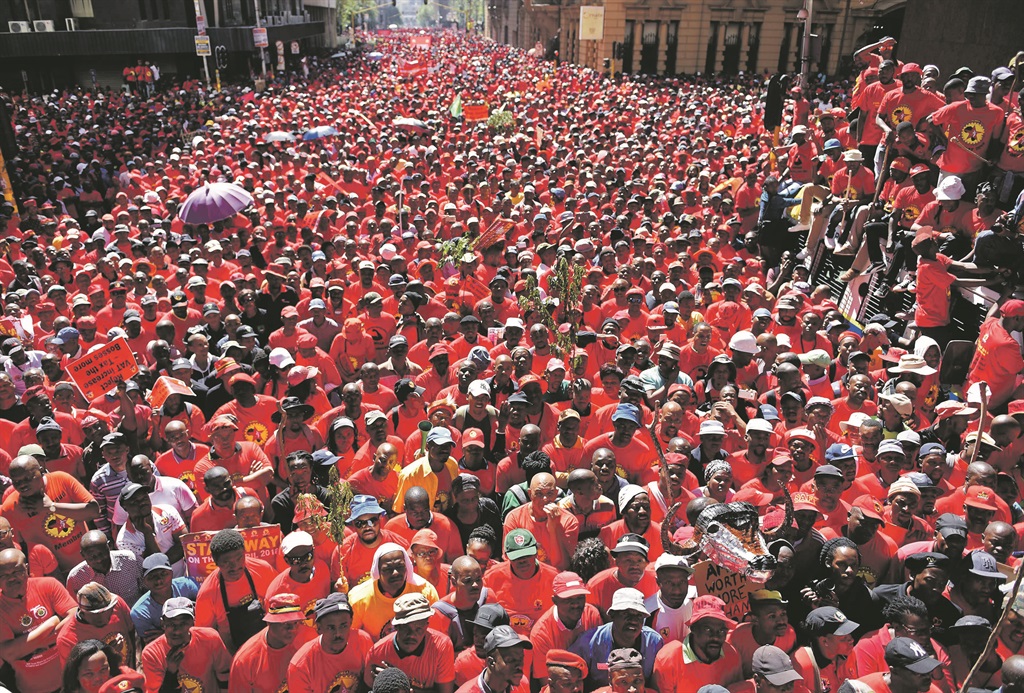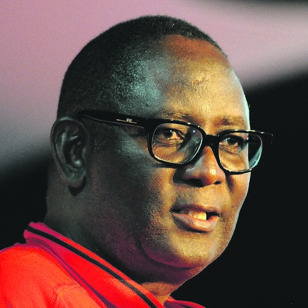
After 25 years of the government’s failure to ensure that the country’s wealth is distributed equitably, now is the time for the working class to say no
The SA Federation of Trade Unions (Saftu) is mobilising the working class and its allies in a colossal mass movement of protest.
It begins with a demonstration at Parliament when Finance Minister Tito Mboweni delivers his budget speech, followed by a two-day general strike and total shut-down on March 26 and 27.
Cities and towns will be occupied by the employed and the unemployed, the homeless, the landless, the propertyless and the marginalised majority of South Africans.
The need for this unprecedented protest is the deepening catastrophe of unemployment, poverty and inequality, attacks on trade unions and the nightmare facing poor communities.
At 37% South Africa has the sixth-highest rate of unemployment in the world.
Even the drop of 0.4% in the last quarter of last year reflects only the annual increase in jobs over the festive season.
The Spectator Index ranks South Africa’s youth unemployment rate as the highest in the world, with 6.2 million young people between the ages of 15 and 24 out of work.
More job losses are coming, with threatened retrenchments at power utility Eskom, the mines, the public broadcaster, SABC, Standard Bank, the public service and possibly SA Airways and retail giant Edcon.
Even if President Cyril Ramaphosa creates the 275 000 new jobs he promised in his state of the nation address (Sona), this is way below the 400 000 new job seekers who enter the labour market every year.
Ramaphosa boasts that South Africa has one of the world’s best social grant systems, but the reason so many people have to survive on grants is that 55% of the population lives in abject poverty and 6 million children live below the food poverty line.
This year marks 25 years since the end of apartheid, during which we ought to have been making big strides towards achieving the Freedom Charter’s demand that “the people shall share in the country’s wealth”.
In fact wealth is shared even more unequally now than in 1994 and inequality is the highest in the world.
The top 1% of South Africans own more than 70% of the country’s wealth.
Yet all this wealth comes from the surplus value produced by workers, who create enough wealth to pay their own wages within the first two hours of a working day, while the rest goes to pay their bosses’ exorbitant salaries and bonuses.
Yet these exploiters use every means possible to force workers to accept lower wages, which further widens inequality, which has grown by cuts in the “social wage” – spending on vital public services – by a succession of austerity budgets designed to please the credit ratings agencies.
Despite ANC and parliamentary resolutions in favour of land expropriation without compensation, no one has said how this will be done.
Education remains starkly divided between well-endowed private schools for a wealthy, mainly white minority; most public schools – for the majority – are understaffed, ill-equipped and often structurally derelict.
Seventy-eight percent of Grade 4 children can’t read for meaning in any language, 61% of Grade 5s can’t do basic maths and half of all learners leave school with no qualifications at all.
Although the increase in last year’s matric pass rate to 78.2% was welcome, the grim fact is that if you compare the number of matriculants against the number of pupils who enrolled in the same year, Equal Education has estimated that the real pass rate figure for that period is only about 50%.
While the rich can pay for quality private healthcare, public hospitals and clinics struggle with overworked staff, lack of drugs and long queues for treatment. The Life Esidimeni tragedy caused the deaths of at least 144 psychiatric patients after they were transferred to unlicensed, unqualified and underfunded NGOs to save money.
The same double standards exist in public transport.
While the rich cruise to work in their limousines, conditions for the poor are illustrated in this horrific report of a train journey from Philippi to Cape Town: “Hundreds of people twist and turn in an effort to find space to stand, a breath of air. More climb in through windows that once, in distant memory, contained Perspex. As the train starts moving, stragglers leap aboard between carriages then climb on to the roof.”
Housing suffers from the same inequality: 14% of South Africans still live in shacks and back yard dwellings, yet the country boasts some of the most expensive real estate and houses in the world for the rich.
It is the same with crime. The rich can pay for private security companies and suburb entrance barriers, while poor communities are held hostage by criminal gangs and drug dealers who terrorise communities in gun battles.
We are also paying a terrible price for years of corruption, theft and fraud by public officials, the executives of state-owned enterprises, political leaders and their cronies in the private sector.
This has lost the country an estimated R27 billion a year.
All this is happening after 25 years in which the ANC government has abysmally failed to implement any of its promises about “radial economic transformation”.
Instead it has adopted neoliberal economic policies dictated by international financial institutions.
Economic power remains in the hands of the mainly white monopoly capitalist class and growth has been so slow that South Africa has been condemned to “junk” status.
Ramaphosa’s Jobs Summit and Sona were merely opportunities to peddle the illusion that these problems are being solved and the lie that there is consensus between labour, business and government in favour of these policies.
Saftu has already, in its first 22 months, offered workers both a genuinely radical, socialist alternative and a completely new type of organisation.
Our mass marches last April amazed everyone with our ability to mobilise thousands of workers.
But we have learnt one central lesson: the working class is disunited and not speaking in one voice. It fights brilliant but isolated battles.
The trade union movement now organises only 24% of the workforce so Saftu is breaking new ground to reach out to the disorganised 76%, and the thousands of workers who are unemployed or in casual, temporary or part-time employment.
We are linking up with poor communities. The time has come to end divisions and unite workers in the formal and informal sector, including the small traders, with unemployed workers and youth.
That is why Saftu convened a Working Class Summit last July attended by 147 grass roots working class formations.
South African workers face immense challenges.
Unless we can turn the tide, things will get even worse as the employers and their allies in government and the media will continue their offensive and all these problems will get even worse.
Vavi is general secretary of Saftu
TALK TO US
Saftu plans to unite the country’s workers with mass marches and shutdowns. Will you join them?
SMS us on 35697 using the keyword WORKERS and tell us what you think. Please include your name and province. SMSes cost R1.50. By participating, you agree to receive occasional marketing material




 Publications
Publications
 Partners
Partners









